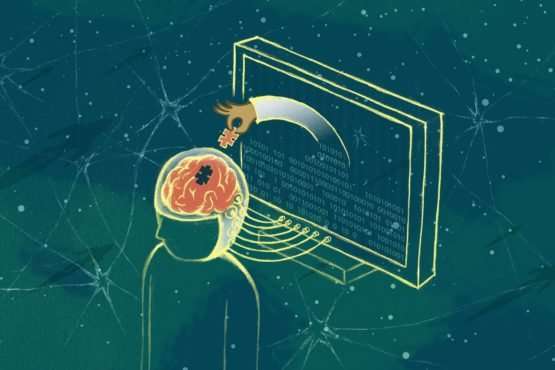Researchers want to heal the brain. Should they enhance it as well?

Despite obvious benefits for people with otherwise untreatable conditions, there could be downsides to brain-machine interfaces being developed to treat disease or drive prosthetic limbs. As researchers get better at building interfaces and understanding the language of the brain, the possibility arises that science could enhance our senses and even our intelligence.
E.J. Chichilnisky, a professor of neurosurgery and of ophthalmology, says we should pursue ever more sophisticated brain-machine interfaces regardless. Chichilnisky co-leads the Stanford Neuroscience Institute's NeuroTechnology Initiative, and in his own research is working on sophisticated, adaptive technologies to help people with severely damaged retinas. The idea is to decode a patient's visual system, then send it carefully orchestrated signals that would allow them to see not just flashes of light, as current systems can, but detailed, high-resolution images.
Such technologies could easily enhance as well as restore sight – in fact, it's almost hard not to, Chichilnisky said. The light-sensing devices in artificial retinas, known as CMOS chips – the same ones used in modern digital cameras – turn out to be so sensitive to infrared light that camera designers need to add filters to make them work properly. In that sense, it may actually take less work to enhance human vision than to restore normal vision.
William Newsome, a professor of neurobiology and director of the Stanford Neurosciences Institute, said that brain-machine interfaces may add new dimensions to longstanding debates about the ethics of medical research with patients as subjects.
"Our brains are highly evolved for life on this planet," and they reflect a number of tradeoffs between, for example, the ability to learn quickly and the ability to take a long view and plan for the future, Newsome said, and fiddling with that balance could lead to negative unintended consequences.
That could be especially worrisome given Silicon Valley's enthusiasm for "hacking the brain," Newsome said, and the push to create brain-machine interfaces on the part of private companies such as Neuralink, billionaire Elon Musk's effort to enhance human intelligence, and Kernel, a similar endeavor toward cognitive enhancement. If those companies, some of which are focused on brain enhancement, make mistakes in the rush to market, it could hurt scientists doing slower, more careful work, Newsome said.
"There is a very blurry line between restoring and enhancing," Chichilnisky said, but "we are going to go there. That's what humanity does." While there have always been both good and bad outcomes of radical technological development, the net result has been mostly positive, and the human condition continues to improve as a result, he said.
Others take a somewhat more pragmatic view. "At one point I would have told you absolutely there's no way we should be trying for enhancement. We need to focus on restoring function for people who have lost it, and that's still my primary focus," said Jaimie Henderson, a professor of neurosurgery.
Now, "I can see the advantage of thinking a little bit beyond that and saying, if we aim for enhancement, maybe by asymptotically approaching that point, we can get closer to actual restoration," which, Henderson said, should always be the goal.














